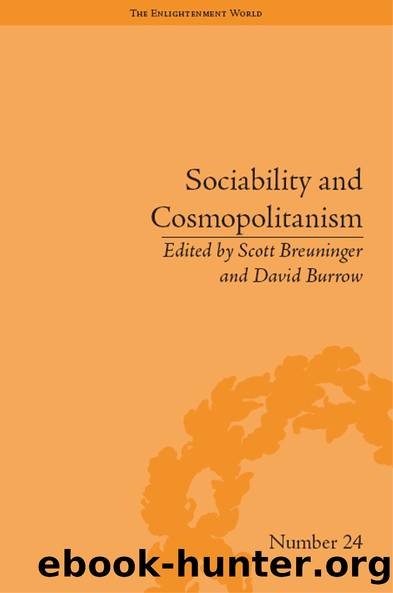Sociability and Cosmopolitanism by David Burrow Scott Brueninger

Author:David Burrow, Scott Brueninger [David Burrow, Scott Brueninger]
Language: eng
Format: epub
Tags: Nonfiction, History, European General
ISBN: 9781317321668
Publisher: Taylor and Francis
Published: 2015-10-06T04:00:00+00:00
Vaughan the Cosmopolitan
Several points require clarification here. Vaughan used the language of douxcommerce to show how trade would unite humanity into a global community and expand human sympathies and benevolence across national boundaries. His was truly a cosmopolitan vision, where national borders dissolved into one international community of trade and humanity. It should also be noted that Vaughan was quoting from Priceâs Observations on the Importance of the American Revolution (1784), and as Priceâs biographer Carl Cone recognized, Price was not only a friend of Benjamin Vaughan, but of all humanity:
The Constitutional Society of London on December 16 [1789] at a dinner attended by him accepted a toast to âDr. Price, the friend of the Universeâ. This title or its variation, the âFriend of Mankindâ, was a usual appellation for Price by this time, and it has been used ever since. In July, 1937, a bronze plaque was unveiled in the public library at Bridgend. The inscription calls Price, âPhilosopher. Preacher. Actuary. Cfaill Dynolrywâ (Friend of Humanity).58
This cosmopolitan description was reminiscent of the manner in which Vaughan described Franklin in the preface to his edition of the Philadelphianâs non-scientific works:
[N]o man ever made larger or bolder guesses than Dr. Franklin from like materials in politics and philosophy, which, after the scrutiny of events and of fact, have been more completely verified. Can Englishmen read these things, and not sigh at recollecting that the country which could produce their author, was once without controversy their own! ⦠Reader, whoever you are, and how much soever you think you hate him, know that this great man loves you enough to wish to do you good: His countryâs friend, but more of mankind.59
In the New and Old Principles of Trade, Vaughan added providential language to suggest that it was Godâs intention to foster universal benevolence:
[I]ndividuals, learning more and more their real public interests, might consider themselves not merely as the members of separate nations (a sentiment which has hitherto seldom been the companion of general liberality or general justice,) but likewise as members of the universe, and as the common children of a common father. That common Father cannot be pleased that the pretended interests of artificial commodities should be made a motive for disturbing either the good order which is said to be the basis of their own institution, or the peace of the general community of nature.60
And in the appendix to his work, Vaughan amplified this argument:
In seeking national opulence, we must not entirely lose the idea of men being of one race, and of men and animals and the great globe itself belonging to the common Creator of them all. It is here then, if anywhere, that we must avail ourselves of that mutual aid which nature has provided for man, when she allows different places abounding in different commodities and different wants, to have the means of a mutual intercourse.61
Vaughan concluded his text with a quote from Humeâs essay, âOn the Jealousy of Tradeâ: âI shall therefore venture to
Download
This site does not store any files on its server. We only index and link to content provided by other sites. Please contact the content providers to delete copyright contents if any and email us, we'll remove relevant links or contents immediately.
| General | Channel Islands |
| England | Northern Ireland |
| Scotland | Wales |
Room 212 by Kate Stewart(5089)
The Crown by Robert Lacey(4785)
Endurance: Shackleton's Incredible Voyage by Alfred Lansing(4743)
The Iron Duke by The Iron Duke(4334)
The Rape of Nanking by Iris Chang(4189)
Joan of Arc by Mary Gordon(4079)
Killing England by Bill O'Reilly(3986)
Say Nothing by Patrick Radden Keefe(3964)
I'll Give You the Sun by Jandy Nelson(3414)
Shadow of Night by Deborah Harkness(3340)
Hitler's Monsters by Eric Kurlander(3317)
Mary, Queen of Scots, and the Murder of Lord Darnley by Alison Weir(3188)
Blood and Sand by Alex Von Tunzelmann(3180)
Eleanor & Park by Rainbow Rowell(3139)
Darkest Hour by Anthony McCarten(3112)
Margaret Thatcher: The Autobiography by Thatcher Margaret(3065)
Book of Life by Deborah Harkness(2913)
Red Famine: Stalin's War on Ukraine by Anne Applebaum(2908)
The One Memory of Flora Banks by Emily Barr(2846)
